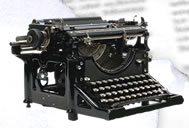Attached is a review of a biography covering the life and times of Brigadier General John Rawlins (1831 - 1869). Rawlins distinguished himself as the Chief of Staff to General Ulysses S. Grant during the American Civil War. It is explained that the two met while Grant was engaged as a sales clerk at a leather shop which was owned by Rawlin's brother; at the outbreak of the war, in 1861, Grant's skill as an officer became clear to many and with each promotion he was able to secure Rawlins' certain advancements in grade. By 1863 Rawlins was promoted to Brigadier General. During Grant's term in the White House, Rawlins served as Secretary of War.
The author of the book, Major-General James Harrison Wilson, is remembered as the man who captured Confederate President Jefferson Davis in flight; the review of his autobiography can be read
here.
These are the letters written between April seventh and ninth, 1865, by Union General Ulysses S. Grant (1822 - 1885) and his Confederate counterpart, General Robert E. Lee (1807 - 1870), that established the terms of surrender and cleared the way for that famous meeting near Appomattox Courthouse.
A short paragraph from General Grant's memoir recalling the "the first private interview with President Lincoln, on the occasion in the early spring of 1864 when he was given command of all the Federal armies:
"In my first interview with Mr. Lincoln alone he stated to me that he had never professed to be a military man or to know how campaigns should be conducted, and never wanted to interfere in them..."
Click here to read about General Grant's Chief of Staff, General John Rawlins.
This Civil War reminiscence was originally printed in a Missouri newspaper and concerned the Union General U.S. Grant (1822 – 1885) when he was a lowly colonel assigned to guard the railroads along the Salt River in Northeast Missouri and how he got along with the local population:
"He talked politely in a calm, dispassionate way, and never with heat or anger. Some of those who visited his camp in those days quote him as saying that if he had considered the war merely to free slaves he would have taken his command and joined the South..."
Click here to read about
General Grant's march on Richmond.
Click here to read about the son of General Grant and his memories of his father at Vicksburg.
A summation of the 1862 Battle of Shiloh:
"Bull Run, the first Southern victory of the war, was followed by others. Nor did the tide of battle turn in favor of the North until General Ulysses S. Grant won in Tennessee the hard fought struggle of Shiloh. This was in April of 1862. Grant first besieged and captured Fort Donelson, then advanced until he was suddenly assailed at Shiloh by the entire army which the Confederates had gathered in the West..."
When the Grant Memorial in New York City was first presented to the public during the Spring of 1897, few could have guessed that one of the places most excited about the monument would be Great Britain. An American journalist posted to that distant isle filed the attached article, quoting from as many as eight British newspapers that saw fit to liberally sprinkle their pages with a variety of laudatory adjectives in praise of General Grant:
"He sprang from the people, he was the son of a plain farmer, and had 'driven team' in his day. Yet he was also a trained soldier. But, from first to last, he was merely the citizen in arms, and with the mighty array he commanded, he resumed his position in civil life as soon as his work was done...The giants of the Civil War were probably the last of a great race."
Click here to read Grant's recollection of the first time he met President Lincoln.
